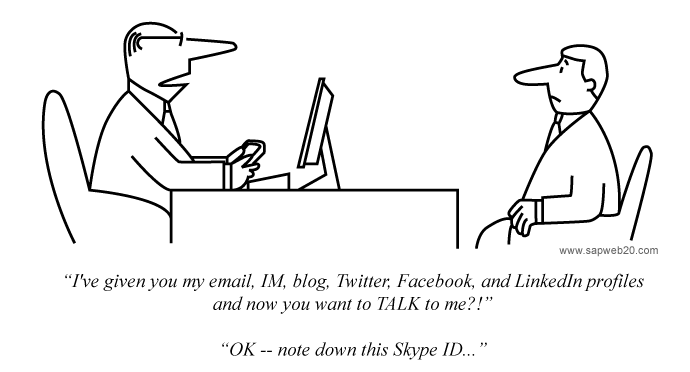I recently had the opportunity to talk with Jack Lynch, Executive Board Member of Wolters Kluwer (one of the largest editors in the world, 3,4 billion of revenue in 2009 and more than 18.000 employees). We talked about the opportunities of collaborative software in organisations such as Wolters Kluwer and allthough the advantages seemed clear we also talked openly about the multiple reasons why the Enterprise 2.0 hype seems to have enormous difficulties to prove itself in the professional environment.
During our conversation and based on the questions mister Lynch asked I was able to get a confirmation on some of the doubts managers still might have when it comes to collaborative software within the organisation. But there was one element that struck my because of it’s simplicity : Won’t social software within the organisation be misused for non-professional use?
Let me translate : Won’t the employees use enterprise 2.0 software like Jive, BlueKiwi, Social Text etc… to crack jokes, organise pizza-parties and arrange after-work pub-nights?
At first I was a bit surprised, after all, it depends on how you put up your internal rules when it comes to the use of social software and most of the times the platforms that have been succesfully setup with my clients didn’t really suffer under the “misuse” of the platform. In some cases it was even promoted to use the platform for more informal communication. But then it dawned to me that it is probably due to one of the common definitions that is given by consultants about Enterprise 2.0 : “Enterprise 2.0 is using the communication mechnanism of Facebook within the organisation”. This definition is not untrue but it lacks precision. I don’t want to go into the details of the real definition of Enterprise 2.0 (please visit www.earlystage.be for more information) but I agree with the fact that the way we use social networks in our private lives might be a benefit for companies if they enable their employees to use the same techniques as they use in their private circle of online friends. Nothing new there but it seems that the comparison that is made with Facebook, Netlog and all the other social networks has led to the idea that the negative aura that hangs around these sites in the heads of the top excutives also has cast its shadow on the multiple enterprise 2.0 softwares that are trying to sell themselves to these companies. Yes, “Negative” with a capital “N”, just count the number of newsarticles about employees who got fired after they spend ages updating their Facebook profile with live-vacation pictures while they were so called sick and don’t estimate the experience these executives have with their kids who tend to Twitter and Facebook every cool experience they have (and dearly considered as NOT ready for publication by mom & dad).
In short : I was gearing up to have long conversations about the risks of SaaS, the complexity of integration with legacy-systems and the danger of change and true, we talked about these things but this remark struck me because it shows how simple some objections can be and worst of all : it’s a valid objection. Social software should be introduced within the company with clear guidelines on how to use it. I don’t think that it will automatically be “abused” but handing out guidelines will also point out how the software can be used and at least help to prevent that it won’t be used at all. The graveyard with empty Sharepoint instances must be numerous and I don’t think there are many wiki’s that are dedicated to jokes and funny video’s.
Finally, do you know what the right answer was to this question? Well, professional collaboration software isn’t anonymous… you can’t hide after a pseudo-identity and abuse of the network is highly autoregulated by the community itself.
